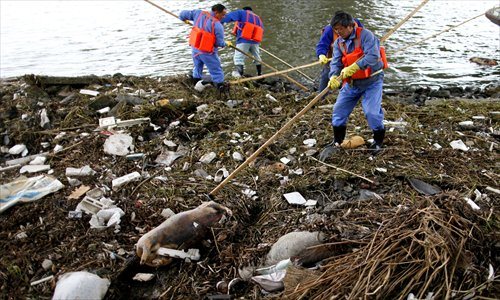
Sanitation workers salvage dead pigs from the Hengliaojing Creek in Shanghai's suburban Songjiang district Sunday. The creek flows into the upper reach of the Huangpu River, a source of the city's drinking water. Photo: Yang Hui/GT
Shanghai authorities are looking for who is responsible for dumping at least 2,200 dead pigs in the upper reaches of the Huangpu River, a source of the city's drinking water, local officials said Sunday.
"The number is expected to rise as there are still six barges that have not returned from collecting carcasses. We have to act quickly to remove them all for fear of causing water pollution," Xu Rong, director of Shanghai Songjiang District Environmental Protection Bureau, told the Global Times.
Xu said the dead pigs were probably dumped in the river in neighboring Zhejiang Province, although the source is not yet known.
On Saturday, the bureau sent a barge from Mishidu Dock in the Songjiang district to the Shuikou River in Pinghu, Zhejiang Province, where it discovered the bodies of many pigs along the Pingshen Waterway, which runs from the city of Pinghu to Shanghai.
According to the ear tags of the dead pigs, they were from farms in Jiaxing and Pinghu in Zhejiang Province, xinmin.com, a Shanghai-based news portal, reported, citing the Shanghai Songjiang District Agricultural Commission.
"Samples of the dead pigs have been sent to the agricultural commission to determine the cause of their deaths. We'll know the results in three days," Xu said.
The local authority sent out six additional barges to search for bodies on Sunday. Twelve boats are now involved in the salvage effort.
Local residents first found dead pigs on Thursday in the Hengliaojing Creek only a few kilometers from a local water treatment plant in an area that is a protected water resource, xinmin.com reported.
"So far, water quality has not been affected, but we have to remove the pigs as quickly as possible and can't let their bodies rot in the water," Xu said.
In order to ensure the water is safe, the bureau started to test it twice a day at the three water intake points in the Songjiang district, according to an announcement posted on the district's official website.
The carcasses will be transported to the animal disposal center in the Fengxian district, said officials.
According to the Animal Epidemic Prevention Law, farmers are required to properly dispose of dead animals. "Farmers have to take the carcasses to their village or community disposal site or properly bury them with disinfectant," Chen Yi, a veterinarian of the Shanghai Academy of Agricultural Sciences, told the Global Times.
When animal die of unexplained causes, farmers should contact a local veterinarian to ensure the cause of death is not a contagious disease. Animals that die from anthrax are not allowed to be buried, Chen said.

Copyright ©1999-2011 Chinanews.com. All rights reserved.
Reproduction in whole or in part without permission is prohibited.